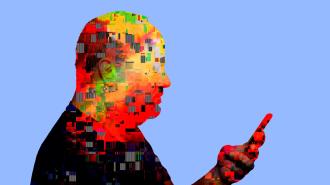A new study has found that storing important information in a digital device frees up the mind to remember other, less important details — which otherwise would be crowded out by the important stuff.
It suggests that tech might be improving our memories, contrary to the popular notion that tech is giving us all “digital dementia.”
Some experts believe our reliance on tech — and not our memories — is giving us all “digital dementia.”
Digital dementia: If you want to remember something, you likely save it in an electronic device. We didn’t have that luxury just a couple decades ago, meaning we needed to memorize a lot more information.
Some experts have warned that this widespread outsourcing of memory to tech is causing an epidemic of digital dementia — essentially, because we aren’t using our memories as much, we’re losing the skill and experiencing a decline in our cognitive abilities.
The knowledge gap: If those experts are right, it could mean people should rethink how they and their children should use electronic devices. But current research has yet to prove that the phenomenon of digital dementia even exists.
“The relationships between brain function and behaviors related to [technology] use is still developing,” Marc Potenza, a professor of psychiatry at the Yale School of Medicine, told Discover Magazine in 2021.
“Larger studies, longitudinal studies, are going to be very helpful in understanding more specifics regarding how specific types and patterns of internet use may be influencing people and influencing them at a brain-behavior relationship,” he continued.
Current research has yet to prove that the phenomenon of digital dementia even exists.
What’s new? Now, researchers at University College London (UCL) have published a study that suggests storing information in devices may actually improve our memory skills — contradicting the concept of digital dementia.
“We found that when people were allowed to use an external memory, the device helped them to remember the information they had saved into it,” said senior author Sam Gilbert. “This was hardly surprising, but we also found that the device improved people’s memory for unsaved information as well.”
In other words, storing some information digitally even helps you remember things you didn’t store.
The study: In the study, 158 adult volunteers were shown up to 12 circled numbers on a touchscreen. They then had to remember to move certain numbers to the left and others to the right.
Participants received money for each correct move they made during the experiment, and the numbers on one side were dubbed “high value,” meaning they got more money for getting those numbers right.
Each person completed the task 16 times. During half of the attempts, they were allowed to set reminders on a digital device, but they had to rely on only their memories for the other rounds.
Storing some information digitally helps you remember things you didn’t store.
Unsurprisingly, people tended to set reminders for the high value numbers, which improved their ability to remember them by 18%. However, people also got better at remembering the low-value numbers, by 27% — even when they didn’t set any reminders about them.
According to UCL’s Gilbert, by storing the most important information on the device, participants freed up their own memory capacity for the less important information.
“The results show that external memory tools work,” he explained. “Far from causing ‘digital dementia’, using an external memory device can even improve our memory for information that we never saved.”
“If a memory tool fails, we could be left with nothing but lower-importance information in our own memory.”
Sam Gilbert
The warning: The experiment also confirmed one potential downfall to our reliance on tech: When the reminders were taken away from participants, they remembered the low-value circles better than the high-value ones.
“We need to be careful that we back up the most important information,” said Gilbert. “Otherwise, if a memory tool fails, we could be left with nothing but lower-importance information in our own memory.”
We’d love to hear from you! If you have a comment about this article or if you have a tip for a future Freethink story, please email us at tips@freethink.com.
